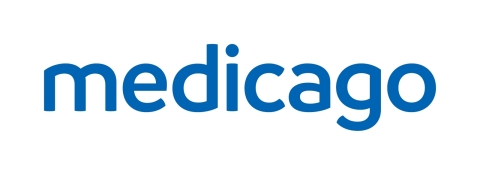Medicago Announces Positive Results in Animal Trials for Its Vaccine Candidate Against COVID-19
Medicago Announces Positive Results in Animal Trials for Its Vaccine Candidate Against COVID-19
QUEBEC CITY, Quebec--(BUSINESS WIRE)--Medicago, a biopharmaceutical company headquartered in Quebec City, announced today that its vaccine candidate for COVID-19 induced a positive antibody response only 10 days after a single dose in mice.
“These positive results are pivotal to initiate a clinical study in healthy volunteers. Once results from a second ‘boost’ dose are available, Medicago will submit a clinical trial application to Health Canada and an investigational new drug submission with the FDA in the United States to allow for the initiation of human clinical trials this summer,” said Nathalie Landry, Executive Vice-President Scientific and Medical Affairs at Medicago. “We are very encouraged about these promising early results achieved with our plant-derived vaccine candidate developed in Canada.”
Though the precise dosage for the vaccine in humans is not yet determined, Medicago estimates its current facilities in Quebec and North Carolina could produce up to 20 million and 100 million annual doses, respectively, of pharmaceutical-grade COVID-19 vaccines. Millions of doses could be available by the end of the year as needed.
"We are working hard to add another 20 million doses capacity in Canada and 100 million in North Carolina for 2022, ahead of the completion of our large-scale factory in Quebec in 2023, which would be able to produce more than 1 billion doses of COVID-19 vaccines per year,” said Michael Schunk, Executive Vice-President Operations at Medicago.
In early March, the company produced a Virus-Like Particle (VLP) of the coronavirus just 20 days after obtaining the SARS-CoV-2 gene and quickly initiated pre-clinical testing. The company expects to initiate Phase I clinical trials this summer. Following this trial, it is anticipated that the Phase 2 study will begin prior to the end of 2020.
Medicago is a leader in plant-based technology having previously demonstrated its capability to be a first responder in a flu pandemic. In 2009, the company produced a research-grade vaccine candidate against H1N1 in just 19 days. In 2012, Medicago manufactured 10 million doses of a monovalent influenza vaccine within one month for the Defense Advanced Research Projects Agency (DARPA), part of the U.S. Department of Defense. In 2015, Medicago also demonstrated that it could rapidly produce an anti-Ebola monoclonal antibody cocktail for the Biomedical Advanced Research and Development Authority (BARDA), part of the U.S. Department of Health and Human Services.
The company’s first product, a seasonal recombinant quadrivalent VLP vaccine for active immunization against influenza, is currently under review by Health Canada following the completion of a robust safety and efficacy clinical program involving over 25,000 subjects.
Medicago’s plant-based platform
The company uses a proprietary plant-based technology to develop protein-based therapeutics. Unlike traditional vaccination development, Medicago does not use animal products or live viruses to create its products. Instead, it uses Virus-Like Particles (VLPs) that mimic the shape and dimensions of a virus, which allows the body to recognize them and create an immune response in a non-infectious way. Clinical trial data suggest that VLPs have a multi-modal mechanism of action that is different from that of inactivated vaccines, activating both arms of the immune system – antibody and cell-mediated responses.
Medicago’s proprietary technology is rapid, versatile, and scalable. As soon as the genetic sequence of a virus is made available, Medicago can develop a clinical-grade vaccine candidate in only a few weeks. Its recombinant technology allows the production of a vaccine that precisely matches the circulating strains, such as in the case of seasonal influenza. The technology is easily scalable, allowing the company to increase volume of production by simply increasing the number of plants it uses.
Product portfolio and pipeline
Medicago’s first product, a Recombinant Quadrivalent Virus-Like Particle (QVLP) seasonal flu vaccine is presently under review by Health Canada. Vaccine candidates for pandemic flu, rotavirus and norovirus are being tested across pre-clinical and Phase II clinical trials. Medicago is also developing antibodies against hMPV, RSV and Opioids.
Facilities
Medicago is headquartered in Quebec City, Canada, and plans to produce COVID-19 vaccines and antibodies in its Quebec pilot plant to respond to the immediate short-term demand. The company also has a manufacturing facility in Durham, North Carolina (USA), which is currently dedicated to the production of vaccines and antibodies for its clinical trials and is expected to support the launch of the quadrivalent VLP influenza vaccine once it is approved. A new state-of-the-art manufacturing plant is under construction in Quebec City, which will be fully functional by 2023 and will have the capability to deliver up to 50 million doses of recombinant quadrivalent influenza vaccine per year.
About Medicago
Medicago is a biopharmaceutical company with more than 450 employees in Canada and the United States. Medicago’s mission is to improve global health outcomes by leveraging innovative plant-based technologies for rapid responses to emerging global health challenges. Medicago is committed to advancing therapeutics against life-threatening diseases worldwide.
For more information: www.medicago.com
Contacts
Media contact (English)
Alissa Von Bargen
+1-647-234-5975
Alissa.VonBargen@gcicanada.com
Media contact (French)
Marie-Pier Côté
+ 418 999-4847
mpcote@tactconseil.ca
